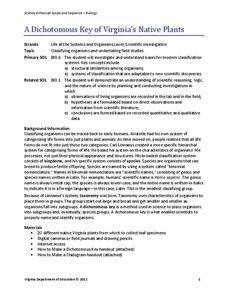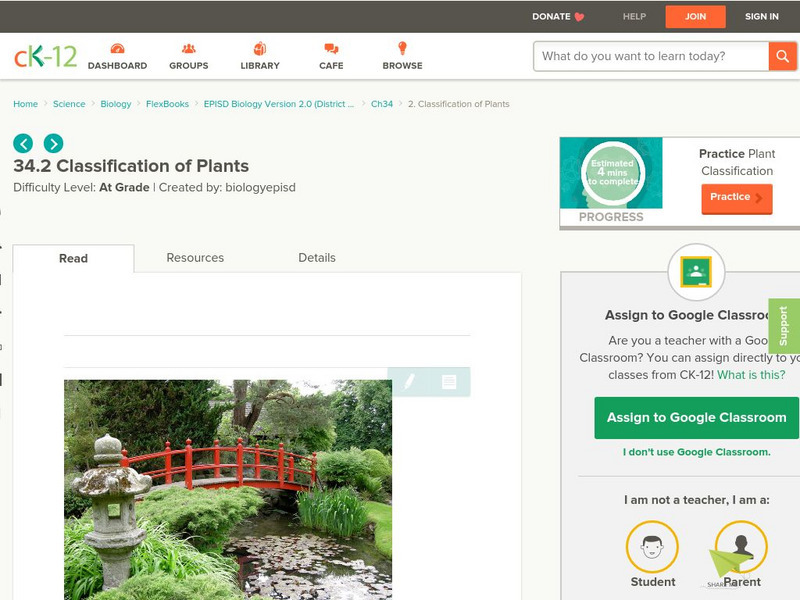Larson Lab
Animal Classification
How are animals classified? Scholars explore animal classification by observing non-living and living specimens. They learn how to organize animals into vertebrates and invertebrates and identify the five vertebrate groups: mammals,...
Core Knowledge Foundation
Chaos within the Living World? NOT!
What are the five kingdoms? Fifth graders engage in a series of investigations and research activities focused on the methods of classification used by scientists, as well as the language they use to describe the similarities and...
Biology Junction
Nonvascular and Simple Vascular Plants: Mosses to Ferns
Sometimes conservationists use specific plants to prevent erosion or fight invasive species. A 50-slide presentation covers both nonvascular and vascular plants. It discusses the plants, their stages and life cycles, reproduction, uses,...
AAAS
Identification and Classification of Grassland Plants
Take learning outside and start classifying grasslands. Young ecologists observe grassland plants in order to classify them into the appropriate species by family. They note their characteristics and where they grow. A true...
Casimir Middle School
Biological Classification Worksheet
Classify living things with a set of worksheets that has pupils sorting and indentifying living and non-living things. Learners use the worksheets as a basis for finding their answers.
Allegany-Limestone Central School
Plantae WebQuest
Send your young life scientists on a plant webquest that has them reading case studies to decide if seeds are seeds and plants are plants.
New South Wales Department of Education
Plant Groups
Bryophytes can grow in temperatures just above zero degrees. This 17th installment in a series of 20 introduces learners to the five groups of plants: algae, bryophytes, pteridophytes, gymnosperms, and angiosperms. Classes then explore...
New South Wales Department of Education
Plant Features
Pine needles are actually modified leaves. In the 16th installment of 20, young scientists explore plants. Through an analysis of leaves — shape, veins, and edges — pupils see how to classify plants based on structural features.
New South Wales Department of Education
History of Plant Classification
Bamboo, the fastest growing plant in the world, can grow up to 35 inches in one day! Pupils learn how plants historically have been classified and determine if these traits are appropriate to use in this 17th lesson of 20. They will also...
Virginia Department of Education
A Dichotomous Key of Virginia’s Native Plants
Can your class correctly classify plant species? Individuals explore native plants of the local environment and correctly classify them into their respective categories. They investigate differences in the plants and discuss similarities...
Prezi
The Six Kingdoms
Why can't dinosaurs clap their hands? Because they no longer exist. The six kingdoms do exist, and through the presentation individuals discover kingdom names, their description, and view photographs of a few samples.
Curated OER
Classification of Organisms
In this classification instructional activity, students solve 3 classification riddles, complete 6 true and false questions, complete 4 sequences, and solve a riddle about the classification of an animal.
Curated OER
Plant classification
In this plant classification learning exercise, students classify plants into flowering and non flowering plants. Students classify 14 different kinds of plants.
Curated OER
School Yard Park/ Ecosystem
Fifth graders examine ecosystems in their schoolyard. In this nature and ecosystem lesson, 5th graders map their schoolyard into workable plots. They classify plants and animals found in the plot. They revisit their site every two weeks...
Curated OER
Plant Classification
Students share with the class how they think plants are classified and are assessed on their prior knowledge. They use a packet to complete throughout the week at their own pace, which includes various activities to familiarize...
Curated OER
Plant Classification
Young scholars participate in an experiment that involves plant classification. They identify and are able to employ three methods of classifying leaves. Each student classifies leaves by each of the following methods: K-I 4.b, d, &...
Alabama Learning Exchange
The Tree of Life
Young scientists use the Internet to evaluate how organisms are classified. They research the phylogeny of organisms and how they are linked in a certain way. Pupils hone research technology skills with their final presentations.
Ohio State University
Ohio State University: Plant Classification
Review of binomial nomenclature and levels of classification in the plant kingdom. A quiz is available for students along with pictures, charts, and links.
Other
Alice Ferguson Foundation: Bridging the Watershed: Plant Identification
Use this interactive guide to identify plants based on their leaves. For each step, you are given two choices, and you continue down the branches until you discover a plant's name.
CK-12 Foundation
Ck 12: Episd: Plant Classification
[Free Registration/Login may be required to access all resource tools.] Understand how plants are classified and be able to identify vascular and nonvascular plants.
CK-12 Foundation
Ck 12: Episd: Classification of Plants
[Free Registration/Login may be required to access all resource tools.] Identify and understand the system used to classify plants and the difference between vascular and nonvascular plants.
Other
Nasa: The Case of the Prize Winning Plants [Pdf]
This program uses a scenario with fictional detective characters to present plant growth to students. While the unit focuses on the basic needs and parts of plants, the topics of plant classification and adaptations, soil formation and...
Biology Pages
Kimball's Biology Pages: Plants
RCN offers information about plants, including the evolution and classification of different groups.
E-learning for Kids
E Learning for Kids: Science: Caribbean Sea: How Can We Classify Plants?
Aaylah is learning how to group some plants. Help her identify different types of plants.























